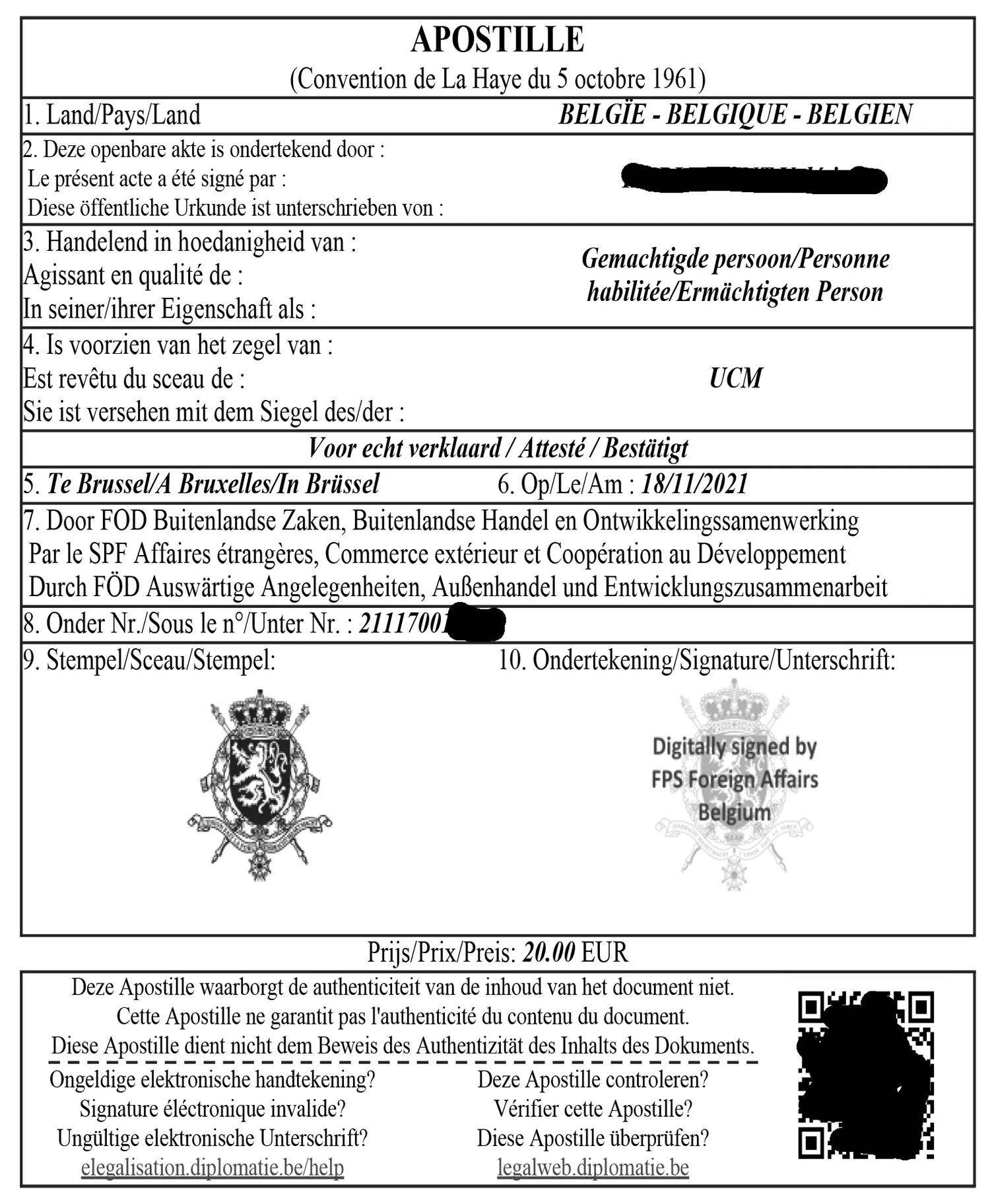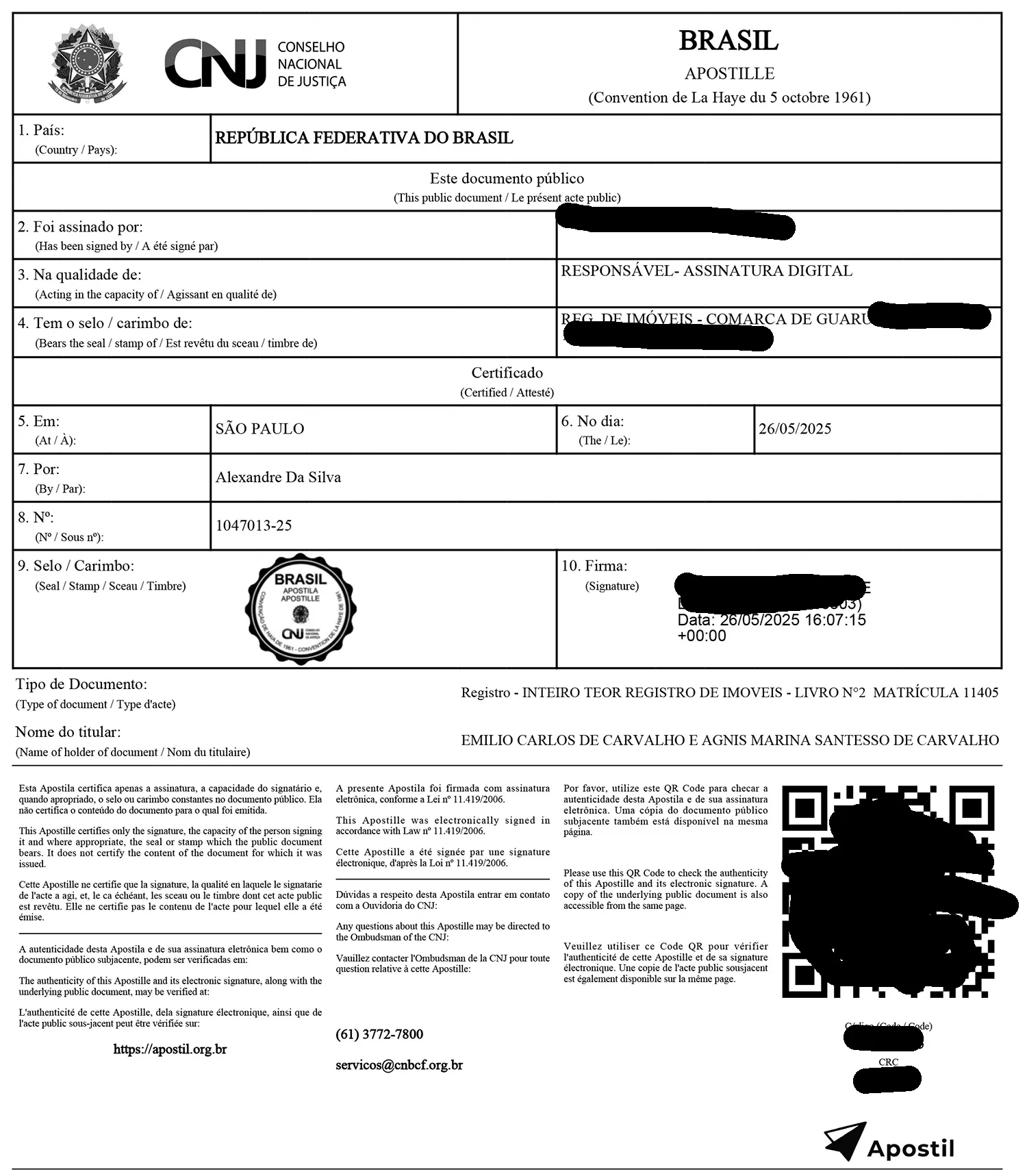
In international document circulation, the procedure for recognising and confirming the legal validity of documents outside the country of issue plays a key role. There are two main ways: consular legalization and apostille.
Consular legalisation is a complex and time-consuming process that requires successive confirmation of a document through the diplomatic or consular missions of each country involved in the chain. Apostille, on the other hand, is a simplified form and is used between states party to the 1961 Hague Convention, making the recognition process much quicker and easier.
As previously noted by Schmidt & Schmidt, with the development of digital technologies, a new form of apostille has appeared - the electronic apostille (e-APP), which allows documents to be issued and verified electronically. This innovative solution is designed to increase the speed, convenience and security of international document circulation. In this article, we will examine the current legal regulation of the electronic apostille, as well as the main challenges faced by states and citizens in its implementation.
International regulation of Electronic Apostille
The 1961 Hague Convention
The Hague Convention on the Simplification of the Legalisation of Foreign Public Documents (1961) was a fundamental international agreement that greatly facilitated the recognition of official documents between participating countries. Prior to its adoption, a complex and multi-stage legalisation procedure through consulates was required. The Convention introduced the institution of the apostille, a special certificate that replaces this entire procedure by confirming the authenticity of a signature, seal or stamp. Examples of documents subject to apostille are educational certificates, ownership documents and corporate documents.
Originally, however, the text of the Convention provided only for a paper apostille format, which was relevant in the era of the 1960s. With the development of digital technologies, it became necessary to adapt the apostille mechanism to the new realities - this is how the electronic apostille came into being. An electronic apostille is a digital analogue of a paper apostille, which provides the same functions, but in an electronic format.
| Apostille | Consular legalization | |
|---|---|---|
| Application | Can be used only between countries that are parties to the Hague Convention on the simplification of document legalization. | Used between states where one or both are not parties to the Hague Convention, or when one of the member states has objected to the accession of the other. |
| Difficulty of obtaining | Middle. An apostille must be obtained from the appropriate authority in the country where the document was issued. | High. Consular legalization requires contacting various authorities and consulates in the country of issuance. |
| Preliminary authentication | Generally not required. | Requires preliminary certification by the authority that issued the document. |
| Legalization at the consulate of the destination country | No need to apply to the consulate of the destination country. | The final step of legalization is carried out at the consulate of the destination country, usually within the country where the document was issued. |

HCCH Recommendations on the implementation of e-APP
The Hague Conference on Private International Law (HCCH),which is responsible for the development and administration of the Hague Convention, has been actively involved in the implementation of the electronic apostille. HCCH has developed a Guide to the Implementation of the Electronic Apostille Program (e-APP), which compiles international best practices and provides recommendations for technical implementation and security assurance.
The document contains recommendations on the mandatory use of a single apostille format, support for qualified electronic signatures, as well as the creation of public electronic registries allowing for fast and reliable authentication of electronic apostilles. Despite this, the use of e-APP remains voluntary - each country decides on its own whether to introduce it into national practice, taking into account its legislation and technical capabilities.
Thus, e-APP serves as a modern tool aimed at making the international circulation of public documents more efficient and secure. The adoption of the electronic apostille is an important step toward the digitalization of legal procedures and the simplification of cross-border document exchange.
Current practice of using the Electronic Apostille
Technical aspects of electronic signatures and certificates
Electronic signatures used for the electronic apostille are based on Public Key Infrastructure (PKI) technology, which provides a high level of security and trust.
A digital certificate confirms the identity of the signer and allows for verification of the signature’s authenticity using a pair of keys — private and public. This ensures the integrity and authenticity of the document.
Such technologies ensure confidentiality, authentication, data integrity and the impossibility of signature negation, which is extremely important in electronic document flow.
Format and template of the Electronic Apostille
One of the most important factors for the successful functioning of the electronic apostille is the standardized document format. The Hague Convention established a mandatory apostille template, that is applied uniformly to both paper and electronic versions. This ensures the transparency and recognizability of the document in any member country.
Using a unified template helps avoid technical issues related to format incompatibility and simplifies the work of government authorities receiving foreign documents. In electronic form, the apostille must be “logically linked” to the original document — meaning that both documents are stored together and verified within a unified system, which significantly enhances trust and security.
The e-APP consists of two components:
1. Electronic Apostille (e-Apostille) — an apostille in digital format, created by software or technical means and sent, for example, by e-mail or available for download.
2. Electronic Register (e-Register) — an online apostille register that allows recipients to verify the authenticity of the document.
Previously, the e-Register was categorized into three categories:
- Category 1: Basic information (apostille number and date);
- Category 2: Basic information + details about the document and the apostille itself;
- Category 3: Capability for digital authentication verification.
In the current version of the Guide, these categories are no longer used. According to Article 7 of the Convention, states are required to include in the register: the name, number, and date of the apostille, as well as the name and position of the person who signed it..
The use of electronic signatures to authenticate electronic apostilles is one of the most complex and debated topics. Unlike the document format, electronic signatures are regulated by national laws, and the standards for their recognition may vary from country to country. In the European Union, for example, qualified electronic signatures that comply with the eIDAS Regulation are widely accepted as a standard, allowing for reliable identification of the signer and verification of the authority that issued the apostille. In other countries, such standards are either only being implemented or do not exist, creating risks when verifying documents internationally.
An essential component of the system is the electronic register of issued apostilles, which must be publicly accessible and contain the minimum information necessary for verification — the apostille’s number and date, details of the authorized signer, and information about the document. Electronic registers make it quick and convenient to verify the authenticity of an apostille, reducing the likelihood of forgery and simplifying the work of official bodies.
Some countries have already implemented such registers with search and data viewing capabilities online, which significantly speeds up processes and increases trust in electronic documents. However, concerns about security, universal accessibility, and fraud protection remain relevant.
Advantages and challenges in the practice of e-APP
The first international forum on electronic notariat and electronic apostilles, held in 2005 in Las Vegas under the auspices of the Hague Conference on Private International Law (HCCH) and the International Union of Latin Notaries (UINL), brought together over 170 representatives from government agencies in 31 countries. Participants unanimously affirmed the importance of introducing modern technologies into the field of apostille and notarial certification.
The forum emphasized that neither the spirit nor the letter of the 1961 Hague Convention prevents the use of modern digital technologies. On the contrary, the use of electronic apostilles and electronic registers fosters mutual trust between states and increases the efficiency of international legal cooperation.
Advantages of electronic apostille:
1. Faster legalization process: The electronic apostille significantly reduces the time required for document legalization compared to the traditional paper-based method, enabling quicker preparation of documents for international use.
2. Convenience and accessibility: The ability to obtain and verify an apostille online eliminates the need for in-person visits to government offices, which is especially important for remote clients and international transactions.
3. Security and online verification: The electronic apostille offers a high level of protection against forgery through the use of digital signatures and specialized electronic registries, allowing for instant verification of a document’s authenticity over the internet.
Challenges in the implementation of e-APP
Despite the clear advantages of introducing the electronic apostille (e-Apostille), its adoption and practical application face a number of significant challenges. These difficulties relate to both legal regulation and technical implementation across different countries.
Voluntary participation in e-APP by convention member states
One of the key issues is that participation in the e-APP program is voluntary. This means that even countries that have acceded to the Convention are not required to implement electronic apostilles or the supporting systems. As a result, there are significant differences: some countries use fully digital solutions, while others continue to issue apostilles exclusively in paper form.
Lack of unified technical standards and formats
Another major challenge is the absence of universal technical requirements regarding the format, content, and verification method of electronic apostilles. Different countries use various electronic document formats, types of digital signatures, and methods for attaching apostilles to public documents. This can create complications in international authentication, especially if the receiving party is unfamiliar with the specific format.
Security concerns and trust in electronic signatures
An electronic apostille involves the use of digital signatures, but due to differences in national regulatory systems, these signatures are not always recognised or correctly verified in another jurisdiction. This is especially relevant for countries that are not part of the Digital Single Space, such as the EU. Lack of transparency as to the source of the digital certificate may undermine the credibility and acceptance of the electronic document.
Limited availability in some countries
Currently, only a limited number of countries have implemented the full functionality of e-APP, including electronic apostilles and public registries for verification. In most cases, the electronic format is used in parallel with the paper format, and the choice between the two depends on the particular authority issuing the apostille. In some countries, digital apostilles are only available for certain types of documents or through certain authorities.
Technical and legal difficulties in verifying electronic apostilles
Even in cases where an electronic apostille has been properly issued, the receiving party may encounter technical or legal difficulties in verifying it. For example, the absence of a link to an official electronic registry or an invalid QR code creates the risk of errors, phishing and even forgery. In addition, there is no centralised international platform for the verification of electronic apostilles, making it difficult for users and reducing the effectiveness of digital solutions.
Electronic Apostille around the world

Despite the clear advantages of digital technology, the practice of using e-APP still remains variable from country to country. This is due to the fact that the HCCH guidelines on the use of e-APP are of a recommendatory nature and do not oblige states parties to the convention to use the electronic format. As a result, some countries have fully integrated the electronic apostille into their state systems, making it possible to file and issue apostilles digitally, while others prefer to stay with the traditional paper form, citing legal, technical and organisational limitations.
According to the e-APP implementation chart published on the website of the Hague Conference the following countries have implemented both components of the program — the e-Apostille and the e-Register :
- Austria, Argentina, Armenia;
- Bahrain, Bangladesh, Belgium, Bolivia, Brazil, Bulgaria;
- Chile, China, Colombia;
- Denmark, Dominican Republic;
- Ecuador, El Salvador, Estonia;
- France;
- Georgia, Greece, Guatemala;
- Israel;
- Kazakhstan;
- Latvia;
- Republic of Moldova; Russia;
- New Zealand;
- Panama, Peru, Philippines;
- Singapore, Slovenia, Spain;
- South Korea;
- Turkey;
- United Kingdom, United States, Uruguay, Uzbekistan;
- Venezuela.
Electronic Apostille in Germany
In German law, the handling of electronic public documents is governed by §§ 371a(3) and 371b of the Code of Civil Procedure (Zivilprozessordnung, ZPO). According to these provisions, documents issued by public authorities or officials and signed with a qualified electronic signature are presumed to be authentic. However, these provisions apply exclusively to domestic German documents . There is no direct regulation in German legislation concerning the status of foreign electronic public documents, which, according to legal experts, indicates a legislative intent not to extend these rules to documents issued outside of Germany.
As a result, the recognition of foreign electronic documents and electronic apostilles in Germany remains legally unregulated. In practice, this means such documents do not possess automatic evidentiary value and require additional verification of authenticity. Although the 1961 Hague Convention, which replaced the previous legalization procedure (§ 438(2) ZPO), allows for the use of apostilles, Germany has not integrated the electronic apostille (e-APP) into its legal system. The Act of Ratification of the Convention recognizes only paper-based apostilles.. Any deviation from the Convention’s terms, as stated by the Federal Constitutional Court of Germany, would require separate legislation, since substantial changes are not covered by the original ratification law.
n the absence of national regulation on electronic apostilles, Germany continues to recognize only the paper format as valid. As a result, even if a document is created electronically in another Hague Convention member state, Germany may refuse to recognize it if the electronic document or signature is not considered equivalent to a paper form and handwritten signature under German law.
It is worth noting that the Guide to the Apostille Convention allows for some divergence among member states regarding the recognition of electronic documents. Nevertheless, according to the Guide, refusal to recognize an apostille only because it was created electronically is permissible only in exceptional cases — for example, when the recipient country’s national law requires a paper format or does not recognize the legal validity of electronic signatures.
Thus, despite global trends toward digitalization and the adoption of electronic legal instruments, Germany maintains a conservative approach and requires additional legal grounds for the full implementation of the e-APP system. As of now, the lack of legal recognition for electronic apostilles limits the international circulation of electronic documents and places Germany in a catch-up position in the field of cross-border document exchange.
Electronic Apostille in Ukraine
Ukraine is a party to the 1961 Hague Convention, and since the introduction of the electronic apostille on November 20, 2015, the country has adopted a new procedure for certifying the authenticity of documents — without changing the list of documents subject to apostille. These include: court decisions, notarial documents (powers of attorney, permissions, declarations), civil status documents (extracts and certificates), as well as documents requiring a double apostille. The latter involves apostilling the original document, notarizing the translation, and then apostilling the translation again.
Unlike the previous procedure, which involved placing a stamp on the paper original, the new electronic apostille is issued as a a separate printed blank with a special stamp containing a QR code glued on it . It is attached to the original document and allows for online verification of its authenticity.
Verification of the electronic apostille can be done in two ways: by scanning the QR code using a mobile device, or via the official website of the Ministry of Justice of Ukraine. Both methods provide quick access to the digital apostille and allow both private individuals and government authorities to confirm its authenticity. This increases the level of trust from foreign institutions and facilitates the international recognition of Ukrainian documents.
Before the implementation of the electronic system, the apostille procedure was centralized and carried out exclusively in Kyiv, which caused significant bureaucratic hurdles and delays. Since 2015, an apostille can be obtained at any local civil registry office (ZAGS) based on the applicant’s place of registration. The processing time ranges from 2 to 4 working days, provided that the required stamps are available. Government regulations set a maximum decision period of 2 days; the remaining time is allocated for technical preparation of the document.
Further development of the service is planned: the possibility to track the status of a document independently, to receive an apostille by e-mail and to print the form by the user. However, in practice, there are difficulties related to insufficient awareness of civil registry offices' staff about the requirements of different countries to the apostille format, which may reduce the quality of service provision.
Electronic Apostille in Russia
On 1 July 2022, a Government Decree came into force in Russia regulating the procedure for processing requests for an apostille to be affixed electronically to official documents intended for use abroad. This decision was a logical step towards the digitalisation of the legal document flow and integration into the international standards of simplified legalisation of documents established by the Hague Convention of 1961.
A request for an electronic apostille is submitted through the Unified Portal of State Services and must be signed with an enhanced qualified electronic signature (UKEP). All interdepartmental verification of documents is carried out using the system of interdepartmental electronic interaction (SMEV), which allows to significantly reduce the time and increase the reliability of processing applications.
An electronic apostille is a digital document containing a two-dimensional QR code that allows to verify its authenticity. A paper duplicate may be issued at the applicant's request. The apostille register is maintained electronically.
An electronic apostille in Russia is affixed only to documents originally prepared electronically and signed with a qualified electronic signature of an authorised person. Simply scanning or photographing a document is not sufficient - electronic keys (in *.sig format) are required to verify the authenticity of the signature. This limits the range of documents available for electronic legalisation, as not all institutions and notaries use certified digital signatures that meet the requirements of the Ministry of Justice.
For example, notaries have implemented an electronic identity procedure, which allows them to convert paper documents into electronic documents and then sign them with a CEP. However, not all regions and institutions have the technical capabilities or regulatory framework to fully implement this procedure.
One of the key limitations of the current model of electronic apostille in Russia is the inability to notarise a translation in electronic format. Since notarisation of a translation is still performed exclusively on paper with physical signatures and seals, an electronic apostille cannot be used in cases where a document requires an official translation. As a result, an apostilled electronic document becomes virtually useless if a paper notarised version of the translation is required to be submitted to a foreign institution.
Electronic Apostille in Kazakhstan
As previously reported by Schmidt & Schmidt, as of June 15, 2024, amendments to the rules for providing the public service of apostillizing official documents in the Republic of Kazakhstan have entered into force. These documents originate from justice authorities, other government bodies, and notaries. The updated procedure provides for full digitalization — applications for apostilles are submitted electronically through the "Electronic Government" portal (Egov) using an electronic digital signature (EDS).
To submit an application through the portal, the following are required:
- an electronic application signed with an EDS (or confirmed by a one-time password if the applicant has a registered phone number);
- a scanned copy of the document to be apostillized;
- a power of attorney (notarized — if submitted by a representative of a natural person; signed by a director — if submitted on behalf of a legal entity);
- additional documents, if necessary.
The application and documents are reviewed by the Public Service Center (PSC), particularly the signature sample and seal imprint on the submitted document, as well as compliance with the requirements of the Hague Convention and national regulations.
If the verification is successful, the authorized official generates the electronic apostille on the same working day using the “E-Apostille” information system. The signed result is sent to the applicant’s personal account on the Egov portal. Apostille processing is completed the next business day after submission.
The electronic apostille is issued in digital format and includes a link to a verification page, where authorities in other countries can confirm its authenticity using the security code and application number. The cost of the service is 0.5 MCI (Monthly Calculation Index) per document, in accordance with subparagraph 7 of Article 615 of the Tax Code of the Republic of Kazakhstan.
What is an apostille?
What is an apostille? Why do I need an apostille? How do I get an apostille? - Our video will explain everything you need to know about the apostille. If you have a document that needs to be certified with an apostille for use abroad, Schmidt and Schmidt will assist you! We provide apostille services in more than 100 countries worldwide.
How can we help?
The classical methods of document authentication - traditional consular legalisation and apostille according to the 1961 Hague Convention - are still widely used in international document circulation. Despite the development of digital technologies, many countries still do not recognise electronic forms of documents and require paper confirmation.
At the same time, electronic apostille is becoming more and more widespread and allows to significantly speed up the process of legalisation of documents, make it more convenient and safer due to the possibility of online verification. However, the introduction of electronic apostille is accompanied by certain technical and legal difficulties, which are important to be aware of.
Our company offers comprehensive support services for all stages of document legalization:
- Obtaining a traditional apostille and completing consular legalization for documents intended for use abroad;
- Processing electronic apostilles in countries where they are implemented, in compliance with international standards;
- Verifying the authenticity and legal validity of apostilled documents — both in paper and electronic formats;
- Preparing documents in accordance with the specific requirements of the destination country and the chosen method of authentication;
- Providing consultations on international regulations and the current practices of using apostilles and electronic apostilles.
We ensure high-quality and timely support at every stage to simplify your international transactions and provide legal certainty when using documents abroad.





